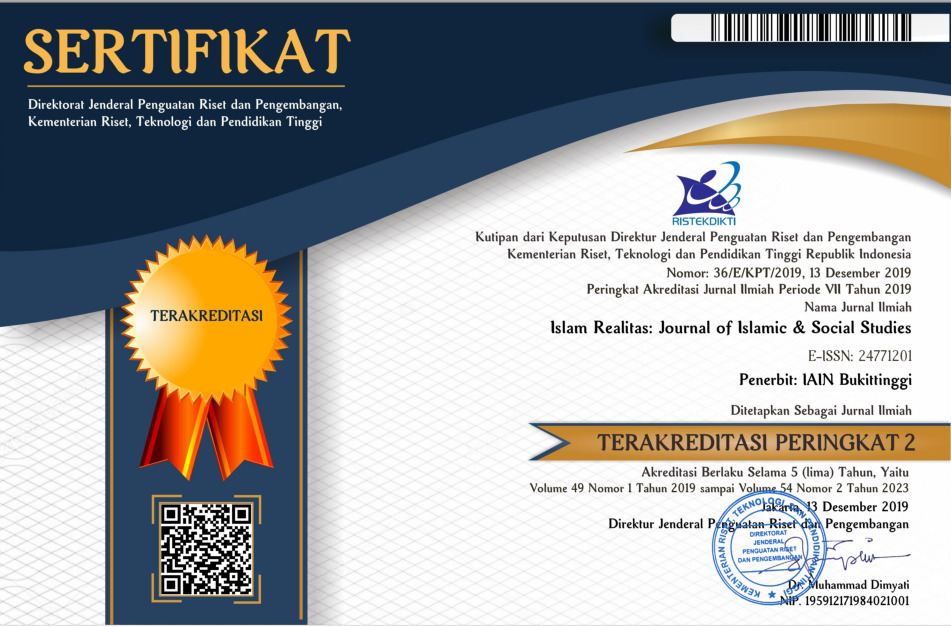Actualization of the MaqÄsid Al-SharÄ«'ah in Indonesia: A Case Study of the Spiritual Counting of Prisoners in Judicial Institutions
DOI:
https://doi.org/10.30983/fuaduna.v7i2.7366Keywords:
Prisoner, Correctional Institution, Islamic Law, MaqÄsid al-SharÄ«'ah, Restorative JusticeAbstract
Correctional institutions are undergoing a transformative shift from punitive spaces to acknowledging the humanity of inmates. This study delves into Indonesian correctional facilities' religious-based coaching programs prioritizing inmate protection, reintegration, and dignity. Analyzing these through Islamic law and Maqasid al-sharī’ahprinciples, it explores personality development models and identifies limitations in current approaches. While initial findings showcase positive outcomes—behavioural changes and reduced distress—the study highlights the predominance of lecture-based programs, signalling the need for more comprehensive Islamic law-based models. Different inmate categories, especially those in serious crimes, display varying spiritual indicator weights. Spiritual development correlates positively with behavioural adjustments. Overcapacity issues in certain facilities, like Salemba and Jakarta Women's Correctional Institutions, pose severe challenges—from limited resources to inadequate staff ratios and hindrances in providing proper medical and psychological support, notably impacting drug abuse victims. The study underscores the urgency of restorative justice in sentencing, emphasizing rehabilitation and societal reintegration.
References
Ainscough, T. S., McNeill, A., Strang, J., Calder, R., & Brose, L. S. (2017). Contingency Management interventions for non-prescribed drug use during treatment for opiate addiction: A systematic review and meta-analysis. In Drug and Alcohol Dependence (Vol. 178). https://doi.org/10.1016/j.drugalcdep.2017.05.028
Ajouaou, M., & Bernts, T. (2015). The Effects of Religious Diversity on Spiritual Care: Reflections from the Dutch Correction Facilities. In Religious Diversity in European Prisons: Challenges and Implications for Rehabilitation (pp. 31–45).
Ako, T., Plugge, E., Mhlanga-Gunda, R., & Van Hout, M. C. (2020). Ethical Guidance for Health Research in Prisons in Low- and Middle-Income Countries: A Scoping Review. In Public Health (Vol. 186). https://doi.org/10.1016/j.puhe.2020.07.008
al-Dibagh, I. K. (2005). Muhammad al-Thahir Ibn ‘Asyur. Dar al-Qalam.
Al-Fijawi, M. F. A., Maulana Akbar Shah, U. T. A., & Muhammad, M. K. (2019). Violations of Basic Rights of Prisoners in Conventional and Islamic Law: Theory and Practice. Intellectual Discourse, 27(2), 455–474.
al-Juwaini, A. al-M. A. al-M. (1997). Al-Burhan fi Usul al-Fiqh. Dar Al-Kutub Al-’Ilmiyyah.
Altheide, D. L., & Schneider, C. J. (1996). Process of Qualitative Document Analysis. Qualitative Media Analysis, 23–41.
Al-Zayla‘i, J. A. A., & Muhammad, J. A.-D. A. (2000). Tabyin al-Haqa’iq Sharh Kanz al-Daqa’iq. Dâr Al-Kutub.
Audah, A. Q. (1998). Al-Tasyri’ al-Jinay al-Islamy (Vol. 1). Dar al-Kitab.
Awaludin, A. H. (1997). Prison Group Dynamics: Political and Criminal Inmates in Indonesia. A Case Study. American University.
Bouma, G. D. (2000). The Research Process South Melbourne (4th ed.). Oxford University Press.
Breadly, J. W. (1938). England, Before and After Wesley: The Evangelical Revival and Social Reform. Hodder.
Carroll, K. M., Nich, C., Lapaglia, D. M., Peters, E. N., Easton, C. J., & Petry, N. M. (2012). Combining Cognitive Behavioral Therapy and Contingency Management to Enhance Their Effects in Treating Cannabis Dependence: Less Can be More, More or Less. Addiction, 107(9). https://doi.org/10.1111/j.1360-0443.2012.03877.x
Corrections, M. D. of. (2020). Policy Directive. Good Time Credits. Michigan Department of Corrections.
Davis, D. R., Kurti, A. N., Skelly, J. M., Redner, R., White, T. J., & Higgins, S. T. (2016). A Review of the Literature on Contingency Management in the Treatment of Substance Use Disorders, 2009–2014. Preventive Medicine, 92. https://doi.org/10.1016/j.ypmed.2016.08.008
DeLacy, M. (1986). Prison Reform in Lancashire, 1700-1850: A study in local Administration (Vol. 33). Manchester University Press.
Deuchar, R., Mørck, L. L., Matemba, Y., McLean, R., & Riaz, N. (2015). Young Offenders: Spiritual Journeys and Criminal Desistance in Denmark and Scotland. Contemporary Youth Contemporary Risk: Journal of Youth Studies Conference.
Drake, D. (2012). Prisons, Punishment and the Pursuit of Security. Springer.
Elbers, J. M., van Ginneken, E. F. J. C., Nieuwbeerta, P., Boone, M., & Palmen, H. (2022). The Effects of Reward Systems in Prison: A Systematic Review. International Journal of Law, Crime and Justice, 71. https://doi.org/10.1016/j.ijlcj.2022.100556
Fazel, S., & Baillargeon, J. (2011). The Health of Prisoners. In The Lancet (Vol. 377, Issue 9769). https://doi.org/10.1016/S0140-6736(10)61053-7
Gendreau, P., & Listwan, S. J. (2018). Contingency Management Programs in Corrections: Another Panacea? Journal of Contemporary Criminal Justice, 34(1). https://doi.org/10.1177/1043986217750426
Giordano, P. C., Longmore, M. A., Schroeder, R. D., & Seffrin, P. M. (2008). A Life Course Perspective on Spirituality and Desistance from Crime. Criminology, 46(1), 99–132.
Hamsir, H., Zainuddin, Z., & Abdain, A. (2019). Implementation of Rehabilitation System of Prisoner for the Prisoner Resocialization in the Correctional Institution Class II A Palopo. Jurnal Dinamika Hukum, 19(1). https://doi.org/10.20884/1.jdh.2019.19.1.2056
Haris, R. (2017). The Influence of The Islamic Psycho-Spiritual Therapy on Muslim Adolescent Drug Addicts. International Islamic University Malaysia.
Hathout, M., Jamil, U., Hathout, G., & Ali, N. (2006). In Pursuit of Justice: The Jurisprudence of Human Rights in Islam. Muslim Public Affairs Council.
Hawley, J., Murphy, I., & Souto-Otero, M. (2013). Prison Education and Training in Europe: Current State-of-Play and Challenges. GHK.
Hefner, R. W., & Prabowo, Y. S. (2021). Islam and Institutional Religious Freedom in Indonesia. Religions, 12(6), 415 14.
Holstein, J. A. (2002). Handbook of Interview Research: Context and Method. Sage.
Ibn Hirz Allah, A. al-Q. (2007). Dawabit I’tibar al-Maqasid fi Mahal al-Ijtihad wa Atharuha al-Fiqhi. Maktabah al-Rushd.
Irish Prison Service. (2012). Incentivised Regimes Policy. . Irish Prison Service.
Johnson, R., Dobrzanska, A., & Palla, S. (2005). The American Prison in Historical Perspective: Race, Gender, and Adjustment. In Prisons: Today and Tomorrow (pp. 22–42).
Juklia, I., & Padmono, W. (2021). Pemenuhan Hak-hak Warga Binaan Pemasyarakatan (WBP) Menurut Undang-undang No. 12 Tahun 1995 Tentang Pemasyarakatan. Justitia: Jurnal Ilmu Hukum Dan Humaniora, 8(1), 185–193.
Liebling, A. (2008). Incentives and Earned Privileges Revisited: Fairness, Discretion, and the Quality of Prison Life. J. Scand. Stud. Criminol. Crime Prev, 9(S1), 25–41.
Masud, M. K. (1995). Shatibi’s Philosophy of Islamic Law. Islamic Research International University Islamabad.
Mears, D. P., Roman, C. G., Wolff, A., & Buck, J. (2006). Faith-based Efforts to Improve Prisoner Reentry: Assessing the Logic and Evidence. Journal of Criminal Justice, 34(4), 351–367.
Messemer, J. E. (2011). The Historical Practice of Correctional Education in the United States: A literature Review. International Journal of Humanities and Social Science, 1(17), 91–100.
Morar, I., Motiuk, L. L., & Keown, L. A. (2019). Characteristics of Offenders Participating in the Romanian Prison Service Credit System. Eur. J. Crime Crim. Law Crim. Justice, 27(3), 242–259.
Morn, F. (1980). The Macmillan Family Encyclopedia. Arete Publishing.
Nichols, H. E. (2016). An Inquiry into Adult Male Prisoners’ Experiences of Education [Ph.D. diss.,]. University of Hull.
Nima, S., & Somboon, Y. (2019). The Islamic Integrated Model for Drug Addict Treatment and Rehabilitation on Kratom Use Among Muslim Adolescents: A Case Study in Krabi Province [Master’s thesis]. Prince of Songkla University.
Nurden, H. (2010). Working With Faith: Youth Work Practice. Palgrave Macmillan.
O’Connor, T. P., & Perreyclear, M. (2002). Prison Religion in Action and its Influence on Offender Rehabilitation. Journal of Offender Rehabilitation, 35(3–4), 11–33.
Osman, S. (2014). Radicalisation, Recidivism and Rehabilitation: Convicted Terrorists and Indonesian Prisons. In Prisons, Terrorism and Extremism (pp. 214–229). Routledge.
Parray, T. A. (2012). The Legal Methodology of “Fiqh al-Aqalliyyat†and its Critics: An Analytical Study. Journal of Muslim Minority Affairs, 32(1), 88–107.
Patton, M. Q. (1999). Enhancing the Quality and Credibility of Qualitative Analysis. Health Services Research, 34(5), 1189–1208.
Pettus-Davis, C., Howard, M. O., Roberts-Lewis, A., & Scheyett, A. M. (2011). Naturally Occurring Social Support in Interventions for Former Prisoners with Substance Use Disorders: Conceptual Framework and Program Model. Journal of Criminal Justice, 39(6), 479–488.
Porpora, D. V, Nikolaev, A., & Hagemann, J. (2010). Abuse, Torture, Frames, and the Washington Post. Journal of Communication, 60(2), 254–270.
Robert, D., & Frigon, S. (2006). Transforming Prison: The Mirage of Health Policy. Deviance et Societe, 30(3), 305–322.
Seo, M. (2013). Missions Without Missionaries: The Social Dimension of Church Growth in Muslim Java, Indonesia. Islam and Christian–Muslim Relations, 24(1), 71–89.
Serin, R. C., & Hanby, L. J. (2009). Offender Incentives and Behavioural Management Strategies. Correctional Service of Canada, Ottawa. Punishment. Soc, 16(1), 104–123.
Service, D. P. (2013). Manual for the Promotion and Demotion Assessment Framework [Manual Assessment Framework for Promotion and Demotion. Correctional Institutions Agency, Ministry of Security and Justice.
Sloas, L., Murphy, A., Wooditch, A., & Taxman, F. S. (2019). Assessing the Use and Impact of Points and Rewards across Four Federal Probation Districts: A Contingency Management Approach. Victims and Offenders, 14(7). https://doi.org/10.1080/15564886.2019.1656691
Soedjono, D. (1972). Kisah Penjara-Penjara di Berbagai Negara. Alumni.
South, J., Bagnall, A.-M., & Woodall, J. (2017). Developing a Typology for Peer Education and Peer Support Delivered by Prisoners. Journal of Correctional Health Care, 23(2), 214–229.
Steiner, B., & Cain, C. M. (2019). The Effect of Removing Sentencing Credits on Inmate Misbehavior. Journal of Quantitative Criminology, 35(1). https://doi.org/10.1007/s10940-017-9372-7
Stewart, D. (2008). The Problems and Needs of Newly Sentenced Prisoners: Results from a National Survey. Ministry of Justice.
Sumpter, C., Wardhani, Y. K., & Priyanto, S. (2021). Testing Transitions: Extremist Prisoners Re-entering Indonesian Society. Studies in Conflict & Terrorism, 44(6), 473–494.
Suto, I., & Arnaut, G. L. Y. (2010). Suicide in Prison: A Qualitative Study. The Prison Journal, 90(3), 288–312.
Usman, B. J. N., & Seregar, E. (2020). Over Kapasitas Lembaga Pemasyarakatan dalam Perespektif Kebijakan Hukum Pidana. Wajah Hukum, 4(2), 436–444.
Walmsley, R. (2018). World Prison Population List (12th ed.). Institute for Criminal Policy Research, Institute for Criminal Policy Research, University of London.
Williamson, J. J. (1911). Prison Life in the Old Capitol and Reminiscences of the Civil War. n.p.
Zwick, R. G. (2018). Brother’s Keeper: Self-Discovery, Social Support, and Rehabilitation through In-Prison Peer Mentorship. Nova Southeastern University.
Interview
Interview with Daniel, Warder of Salemba Correctional Institution Class IIA, October 19th, 2021, 11:30 a.m.
Interview with Herlin Candrawati, Bc.I.P., S.H., M.H., Head of Women's Penitentiary Class IIA in Bandar Lampung, Oktober 19th, 2021, 11:00 a.m.
Interview with Leader of MUI, KH. Maruf Amin, at MUI Office Centre of Jakarta on September 15th, 2016.
Interview with Putranti Rahayu, Bc, IP, S.H, Head of Women's Penitentiary Class IIA in Bandar Lampung, April 8th, 2021, 10:00 a.m.
Downloads
Submitted
Accepted
Published
Issue
Section
License
Authors who publish with this journal agree to the following terms:
- Authors retain copyright and grant the journal right of first publication with the work simultaneously licensed under a Creative Commons Attribution-ShareAlike 4.0. that allows others to share the work with an acknowledgment of the work's authorship and initial publication in this journal.
- Authors are able to enter into separate, additional contractual arrangements for the non-exclusive distribution of the journal's published version of the work (e.g., post it to an institutional repository or publish it in a book), with an acknowledgment of its initial publication in this journal.
- Authors are permitted and encouraged to post their work online (e.g., in institutional repositories or on their website) prior to and during the submission process, as it can lead to productive exchanges, as well as earlier and greater citation of published work (See The Effect of Open Access).














